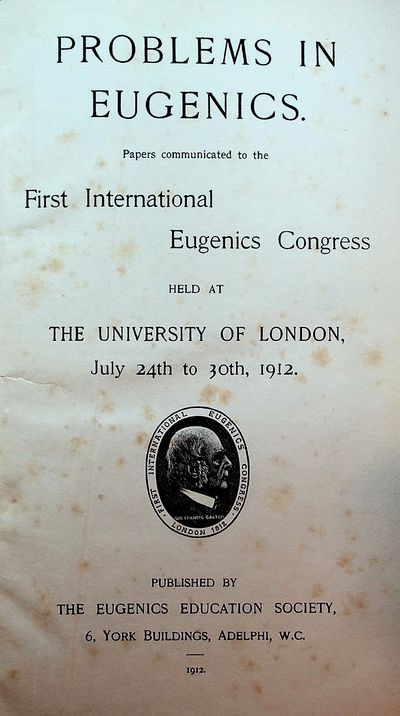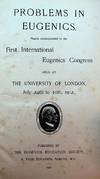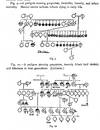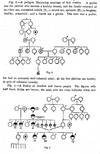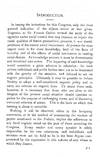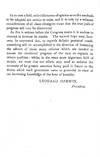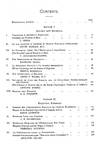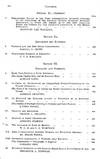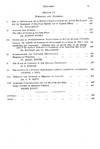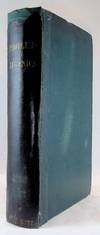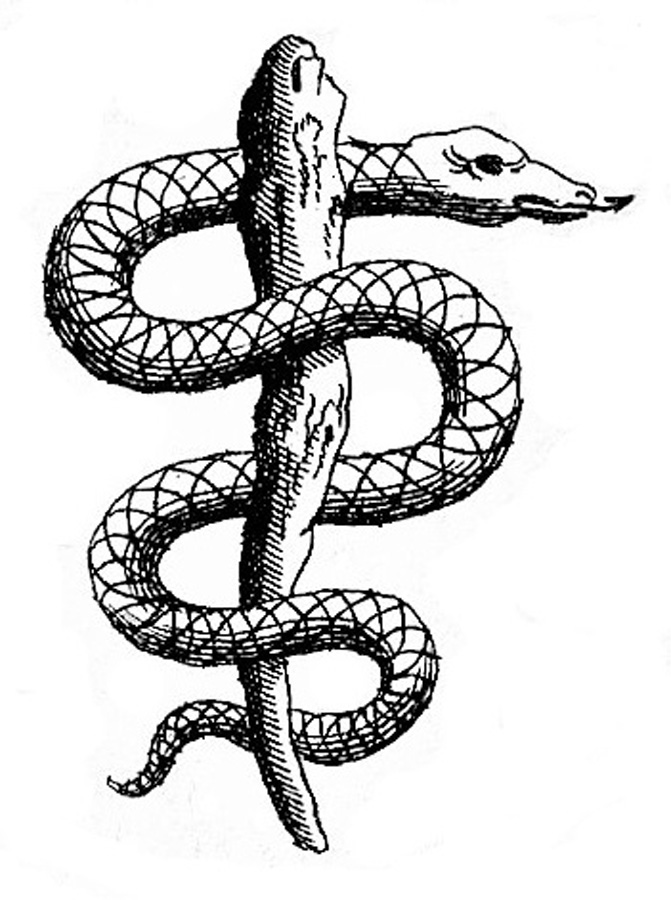Carousel content with 1 slides.
A carousel is a rotating set of images, rotation stops on keyboard focus on carousel tab controls or hovering the mouse pointer over images. Use the tabs or the previous and next buttons to change the displayed slide.
first edition cloth binding
1912 · Adelphi, W.C.
by Gotto, Sybil and Darwin, Leonard
Adelphi, W.C.: The Eugenics Education Society, 1912. First edition.
SCARCE PROCEEDINGS OF FIRST INTERNATIONAL EUGENICS CONGRESS, PRESIDED BY LEONARD DARWIN.
15.5x24 cm hardcover, publisher's green cloth binding, gilt title to spine, institutional library bookplate to front paste-down, "withdrawn" handstamp to front free endpaper, i-xix, 490 pp. Rebacked, preserving original spine, cover corners worn, front hinge cracked, light foxing to first and last pages, browning to page edges, binding tight and pages clean and unmarked. Good+ in custom archival mylar cover. Papers in English, French, and Italian.
CONTENTS: Variazione E Erededita Nell'uomo (truncated) (Variation and Heredity in Man) G. SERGI; On the Increase of Stature in certain European Populations SOREN HANSEN; Le Cosidette Leggi Dell'Ereditarieta Nell'Uomo (The So-called Laws of Heredity in Man) V. GUIFFRIDA-RUGGERI; The Inheritance of Fecundity ... RAYMOND PEARL; La PsicoLOGiA Ethnica e La Scienza Eugenistica (Ethnic Psychology and the Science of Eugenics) ENRICO MORSELLI; The Inheritance of Epilepsy DAVID F. WEEKS; L'influence de l'age des Parents sur les Caracteres Psycho-Physique DES ENFANTS (The Influence of Parental Age on the Psycho-Physiological Characters of Children) ANTONIO MARRO; Genetics and Eugenics R. C. PUNNETT; Rapport sur l'organisation Pratique de l'Action Eugenique (Report on the Practical Organisation of Eugenic Action) LOUIS QUERTON; Marriage Laws and Customs C. B. DAVENPORT; Eugenique Selection et Determinisme Des Tares (Eugenics Selection and the Origin of Defects) FREDERIC HOUSSAY; La Puericulture avant la Procreation (General Considerations upon " Education before Procreation ") ADOLPHE PINARD; Preliminary Report to the First International Eugenics Congress of the Committee of the Eugenics Section, American Breeders' Association to Study and Report as to the Best Practical Means for Cutting off the Defective Germ-Plasm in the Human Population BLEE,KER VAN WAGENEN; Eugenics and the New Social Consciousness SAMUEL G. SMITH; Practicable Eugenics in Education F. C. S. SCHILLER; Elite Fisio-Psichica e Elite Economica The Psycho-Physical Elite, and the Economic Elite) ACHILLE LORIA; La Cause de l'Inferiorite des Characteres Psycho-Physiologiques des Classes Inferieurs ... (The Cause of the Inferiority of Physical and Mental Characters in the Lower Social Classes) ALFREDO NICEFORO; La Fertilite des Mariages suivant la Profession et la Situation Sociale (The Fertility of Marriages according to Profession and Social Position) LUCIEN MARCH; Eugenics and Militarism VERNON L. KELLOGG; Eugenics in Party Organization ROBERTO MICHELS; The Influence of Race on History W. C. D. and C. D. WHETHAM; Some Interrelations between Eugenics and Historical Research ADAMS WOODS; II Contributi Demografici ai Problemi dell' Eugenica (The Contributions of Demography to Eugenics) CORRADO GINI; Maternity Statistics of the State of Rhode Island, State Census of 1905 FREDERICK L. HOFFMAN; Sur la Prophylaxie de la Syphilis Hereditaire et Son Action Eugenique (On the Prophylaxis of Hereditary Syphilis and its Eugenic Effect) Dr. HALLOPEAU; Alkohol und Eugenik (The Effect of Alcohol on the Germ-Plasm) Dr. ALFRED MOEN; Alcoolisme et Degenerescence. Statistiques du Bureau central d'Administration des Alienes de Paris et du Departement de la Seine de 1867 a I912 (Alcoholism and Degeneracy. Statistics from the central office for the management of the insane of Paris and the Department of the Seine from 1867 to 1912 Drs. MAGNAN and FILLASSIER; Rassenhygiene und Arztliche Geburtshilfe (Eugenics and Obstetrics) AGNES BLUHM; The Place of Eugenics in the Medical Curriculum L E. JORDAN; The History of a Healthy Sane Family, showing Longevity, in Catalonia VALENTI Y VIVO; Heredity and Eugenics in Relation to Insanity F. W. MOTT; Quelques Considerations sur les Enfants Arrieres (Some Remarks on Backward Children) RAOUL DUPUY.
LEONARD DARWIN (1850 – 1943), son of Charles Darwin and president of the Congress, was an English politician, economist and eugenicist. He was president of the Royal Geographical Society from 1908 to 1911 and chairman of the British Eugenics Society from 1911 to 1928 – succeeding his half-cousin once removed Francis Galton. Darwin played an important part in the life of the geneticist and statistician Ronald Fisher, supporting him intellectually, morally and sometimes financially.
Cited by RC Engs in The Eugenics Movement (2005): "As the early-twentieth-century eugenics movement spread on both sides of the Atlantic, the First International Eugenics Congress brought together eugenics leaders from the United States, Britain, Germany, and other countries. The congress, held at the University of London Jiily 24-30, 1912, was hosted by the British Eugenics (Education) Society. Attendance included 324 individuals from around the world. The conference name tags bore the likeness of Francis Galton, the father of eugenics. This major race improvement, or eugenics, conference was aimed at all organizations and individuals studying eugenics, race hygiene, and heredity. Britain's pivotal eugenics leader, Leonard Darwin, son of naturalist Charles Darwin, served as chairman. Other British delegates included eugenics author C. W. Saleeby, geneticist William Bateson {1861-1926), and Winston Churchill (1874-1965), then secretary of state for home affairs and later prime minister. Eugenics supporter and Statistician R. A. Fisher, as a student, served as a steward; statistician Karl Pearson did not attend. From the United States, 'vice presidents,' or those who helped organize the conferences, included inventor Alexander Graham Bell, eugenics leader Charles Davenport, university presidents Charles Eliot and David Starr Jordan. Other notable American delegates were anthropologist Henry Fairfield Osbom; eugenics supporter Madison Grant; and geneticists William E. Castle, Frederick A. Woods, and Raymond Pearl. The conference sessions were divided into four categories, the relationship of eugenics to (1) biological research, (2) sociological and historical research, (3) legislation and social customs, and (4) the practical applications of eugenic principles. The papers and proceedings from the conference program were published by the Eugenics Society in two volumes. Vol. I. Problems in Eugenics: Papers Communicated to the First International Eugenics Congress (1912), contained 490 pages. Most of the papers presented at the conference were found in this volume (offered here). Specific titles included "Eugenics and Militarism," "The Influence of Race on History," and "Backward Children." Vol. 2, Problems in Eugenics: Report of Proceedings, contained 189 pages. Although it ineluded a few papers, its primary focus was discussion following presentations. A planning committee was formed to plan the next congress, in 1913. However, due to World War I the committee did not meet until October 1919, in London, where it agreed to hold a Second Intemational Congress of Eugenics in New York in 1921." (Inventory #: 1691)
SCARCE PROCEEDINGS OF FIRST INTERNATIONAL EUGENICS CONGRESS, PRESIDED BY LEONARD DARWIN.
15.5x24 cm hardcover, publisher's green cloth binding, gilt title to spine, institutional library bookplate to front paste-down, "withdrawn" handstamp to front free endpaper, i-xix, 490 pp. Rebacked, preserving original spine, cover corners worn, front hinge cracked, light foxing to first and last pages, browning to page edges, binding tight and pages clean and unmarked. Good+ in custom archival mylar cover. Papers in English, French, and Italian.
CONTENTS: Variazione E Erededita Nell'uomo (truncated) (Variation and Heredity in Man) G. SERGI; On the Increase of Stature in certain European Populations SOREN HANSEN; Le Cosidette Leggi Dell'Ereditarieta Nell'Uomo (The So-called Laws of Heredity in Man) V. GUIFFRIDA-RUGGERI; The Inheritance of Fecundity ... RAYMOND PEARL; La PsicoLOGiA Ethnica e La Scienza Eugenistica (Ethnic Psychology and the Science of Eugenics) ENRICO MORSELLI; The Inheritance of Epilepsy DAVID F. WEEKS; L'influence de l'age des Parents sur les Caracteres Psycho-Physique DES ENFANTS (The Influence of Parental Age on the Psycho-Physiological Characters of Children) ANTONIO MARRO; Genetics and Eugenics R. C. PUNNETT; Rapport sur l'organisation Pratique de l'Action Eugenique (Report on the Practical Organisation of Eugenic Action) LOUIS QUERTON; Marriage Laws and Customs C. B. DAVENPORT; Eugenique Selection et Determinisme Des Tares (Eugenics Selection and the Origin of Defects) FREDERIC HOUSSAY; La Puericulture avant la Procreation (General Considerations upon " Education before Procreation ") ADOLPHE PINARD; Preliminary Report to the First International Eugenics Congress of the Committee of the Eugenics Section, American Breeders' Association to Study and Report as to the Best Practical Means for Cutting off the Defective Germ-Plasm in the Human Population BLEE,KER VAN WAGENEN; Eugenics and the New Social Consciousness SAMUEL G. SMITH; Practicable Eugenics in Education F. C. S. SCHILLER; Elite Fisio-Psichica e Elite Economica The Psycho-Physical Elite, and the Economic Elite) ACHILLE LORIA; La Cause de l'Inferiorite des Characteres Psycho-Physiologiques des Classes Inferieurs ... (The Cause of the Inferiority of Physical and Mental Characters in the Lower Social Classes) ALFREDO NICEFORO; La Fertilite des Mariages suivant la Profession et la Situation Sociale (The Fertility of Marriages according to Profession and Social Position) LUCIEN MARCH; Eugenics and Militarism VERNON L. KELLOGG; Eugenics in Party Organization ROBERTO MICHELS; The Influence of Race on History W. C. D. and C. D. WHETHAM; Some Interrelations between Eugenics and Historical Research ADAMS WOODS; II Contributi Demografici ai Problemi dell' Eugenica (The Contributions of Demography to Eugenics) CORRADO GINI; Maternity Statistics of the State of Rhode Island, State Census of 1905 FREDERICK L. HOFFMAN; Sur la Prophylaxie de la Syphilis Hereditaire et Son Action Eugenique (On the Prophylaxis of Hereditary Syphilis and its Eugenic Effect) Dr. HALLOPEAU; Alkohol und Eugenik (The Effect of Alcohol on the Germ-Plasm) Dr. ALFRED MOEN; Alcoolisme et Degenerescence. Statistiques du Bureau central d'Administration des Alienes de Paris et du Departement de la Seine de 1867 a I912 (Alcoholism and Degeneracy. Statistics from the central office for the management of the insane of Paris and the Department of the Seine from 1867 to 1912 Drs. MAGNAN and FILLASSIER; Rassenhygiene und Arztliche Geburtshilfe (Eugenics and Obstetrics) AGNES BLUHM; The Place of Eugenics in the Medical Curriculum L E. JORDAN; The History of a Healthy Sane Family, showing Longevity, in Catalonia VALENTI Y VIVO; Heredity and Eugenics in Relation to Insanity F. W. MOTT; Quelques Considerations sur les Enfants Arrieres (Some Remarks on Backward Children) RAOUL DUPUY.
LEONARD DARWIN (1850 – 1943), son of Charles Darwin and president of the Congress, was an English politician, economist and eugenicist. He was president of the Royal Geographical Society from 1908 to 1911 and chairman of the British Eugenics Society from 1911 to 1928 – succeeding his half-cousin once removed Francis Galton. Darwin played an important part in the life of the geneticist and statistician Ronald Fisher, supporting him intellectually, morally and sometimes financially.
Cited by RC Engs in The Eugenics Movement (2005): "As the early-twentieth-century eugenics movement spread on both sides of the Atlantic, the First International Eugenics Congress brought together eugenics leaders from the United States, Britain, Germany, and other countries. The congress, held at the University of London Jiily 24-30, 1912, was hosted by the British Eugenics (Education) Society. Attendance included 324 individuals from around the world. The conference name tags bore the likeness of Francis Galton, the father of eugenics. This major race improvement, or eugenics, conference was aimed at all organizations and individuals studying eugenics, race hygiene, and heredity. Britain's pivotal eugenics leader, Leonard Darwin, son of naturalist Charles Darwin, served as chairman. Other British delegates included eugenics author C. W. Saleeby, geneticist William Bateson {1861-1926), and Winston Churchill (1874-1965), then secretary of state for home affairs and later prime minister. Eugenics supporter and Statistician R. A. Fisher, as a student, served as a steward; statistician Karl Pearson did not attend. From the United States, 'vice presidents,' or those who helped organize the conferences, included inventor Alexander Graham Bell, eugenics leader Charles Davenport, university presidents Charles Eliot and David Starr Jordan. Other notable American delegates were anthropologist Henry Fairfield Osbom; eugenics supporter Madison Grant; and geneticists William E. Castle, Frederick A. Woods, and Raymond Pearl. The conference sessions were divided into four categories, the relationship of eugenics to (1) biological research, (2) sociological and historical research, (3) legislation and social customs, and (4) the practical applications of eugenic principles. The papers and proceedings from the conference program were published by the Eugenics Society in two volumes. Vol. I. Problems in Eugenics: Papers Communicated to the First International Eugenics Congress (1912), contained 490 pages. Most of the papers presented at the conference were found in this volume (offered here). Specific titles included "Eugenics and Militarism," "The Influence of Race on History," and "Backward Children." Vol. 2, Problems in Eugenics: Report of Proceedings, contained 189 pages. Although it ineluded a few papers, its primary focus was discussion following presentations. A planning committee was formed to plan the next congress, in 1913. However, due to World War I the committee did not meet until October 1919, in London, where it agreed to hold a Second Intemational Congress of Eugenics in New York in 1921." (Inventory #: 1691)
